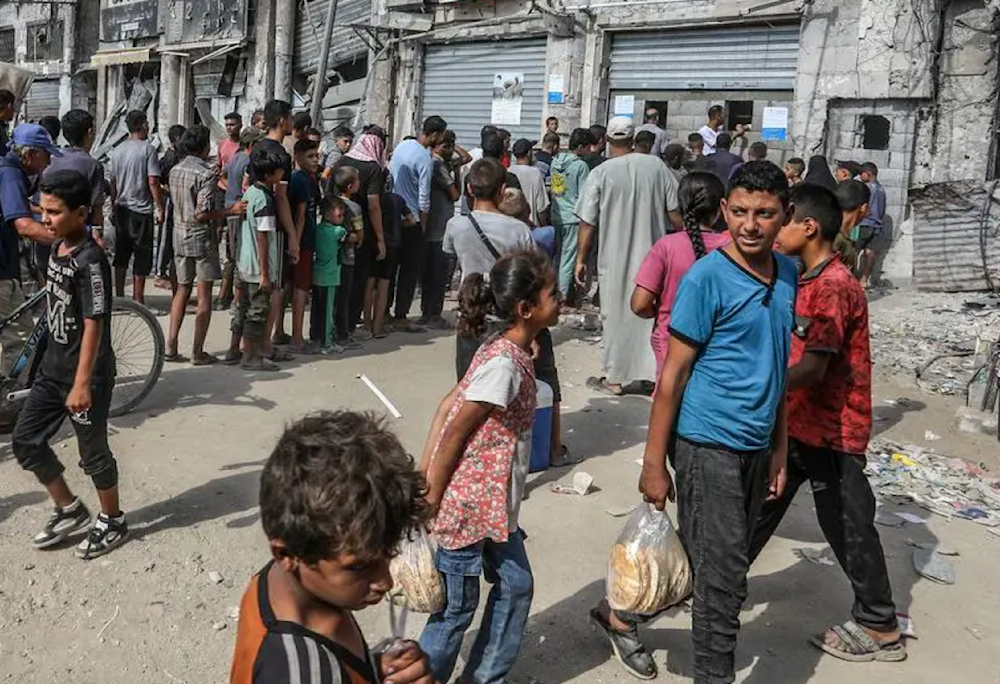Famine imminent in northern Gaza as siege forces bakeries to close
Accusations against "Israel" of conducting a "starvation campaign" against Palestinians in the Gaza Strip and weaponizing humanitarian aid continues.
-

Palestinians line up in front of a bakery in Khan Younis in Gaza on September 8, 2024 (Anadolu)
Palestinians have warned of an impending famine in the northern Gaza Strip, where a continued Israeli siege has caused five of six functional bakeries to close, according to Anadolu news agency.
Kamel Ajjour, a baker owner, told Anadolu on Sunday that 5 out of 6 bakeries in the area have closed due to "Israel's" blocking of fuel and raw materials.
"Our bakery is the only one still functioning in the area and is likely to close within a week if Israel continues to block the entry of fuel and essential supplies," Ajjour said.
He noted that fuel had not been delivered to bakeries in northern Gaza for more than ten days and that critical ingredients like flour, sugar, and yeast have been "significantly reduced for nearly a month,” warning of a worse crisis if his bakery is also forced to close.
Last week, UN expert Michael Fakhri accused "Israel" of conducting a "starvation campaign" against Palestinians in the Gaza Strip, warning that the entity is weaponizing humanitarian aid to inflict harm on residents of the besieged area.
Testimonies on the starvation crisis in #Gaza reveal a dire situation: "This is a population that is starving to death."
— Al Mayadeen English (@MayadeenEnglish) July 11, 2024
From #UN leaders to economists, they all agree that the severity and spread of famine in Gaza are unprecedented.#GazaGenocide #Palestine pic.twitter.com/UVbuhRUJLo
In a report presented to the UN General Assembly, the UN Special Rapporteur on the Right to Food Michael Fakhri stated that since the Israeli military aggression against Gaza began in early October of the previous year, the flow of food, medicine, and other humanitarian supplies has been severely restricted.
"By December, Palestinians in Gaza made up 80 percent of the people in the world experiencing famine or catastrophic hunger," Fakhri stressed.
He further noted, "Never in post-war history had a population been made to go hungry so quickly and so completely as was the case for the 2.3 million Palestinians living in Gaza."
After a year of no fresh food, Gazans elated to receive apples
In Gaza. Haytham Dalou's three children, who have been consuming canned food for over a year, were overjoyed to learn that fresh food had finally come.
Dalou expressed that his children had seen apples "for the first time in nine months," recalling how "they jumped out of their beds when they knew they would eat fruit."
The majority of the enclave's approximately 2.2 million residents are experiencing extreme hunger.
The United Nations reports that dozens of people have died as a result of starvation. Months of reliance on canned food, with little to no access to fresh fruit, vegetables, or protein, are severely impacting Palestinians' health.
Aid organizations claim they have just been able to bring fresh fruit and frozen meat to the north, where many Palestinians have not seen such products in months.
Arwa Suliman, a 29-year-old mother of two from northern Gaza, received a chicken this week for the first time since the Israeli aggression began. She and 9 relatives will share the chicken after months of surviving on canned food, which has created health issues for the family.
Suliman told The Wall Street Journal that the chicken would be saved for Friday, "the day of the week we traditionally cooked special meals before the war.”
It is uncertain whether the recent delivery of fresh fruit, vegetables, and frozen meat to northern Gaza will extend or continue.
Not only are limited border crossings into Gaza an issue, but shipping perishable products, such as meat, poses considerable issues due to frequent power outages.
Steve Fake, a spokesman for American Near East Refugee Aid, a US-based humanitarian organization that recently distributed a rare 22-ton shipment of frozen meat in northern Gaza—a months-long effort, explained that "the need for ensuring a continuous cold chain was a major source of delay."
“The need to keep perishables like meat frozen or refrigerated is also a logistical obstacle now, given the very limited availability of refrigerators or power sources to run them,” Fake reported.

 4 Min Read
4 Min Read










